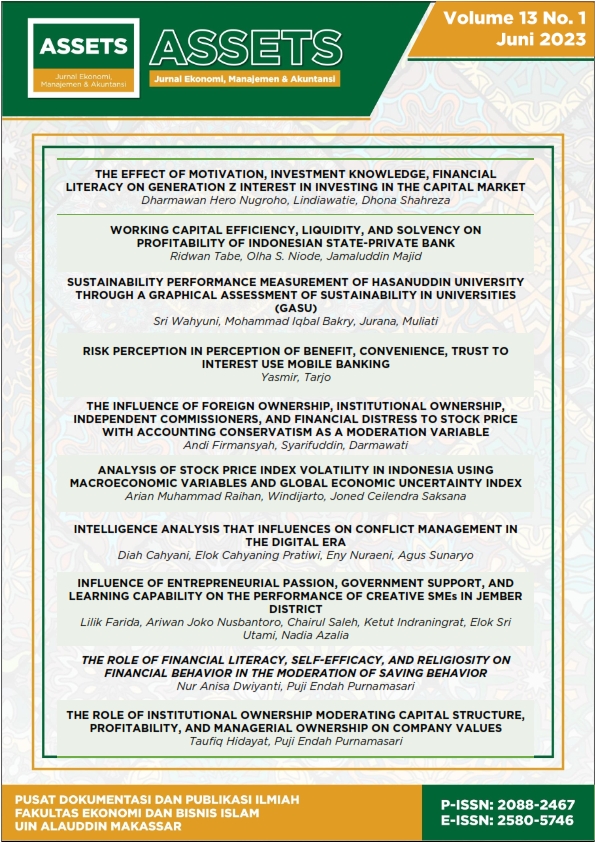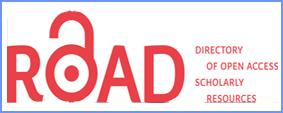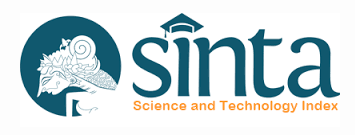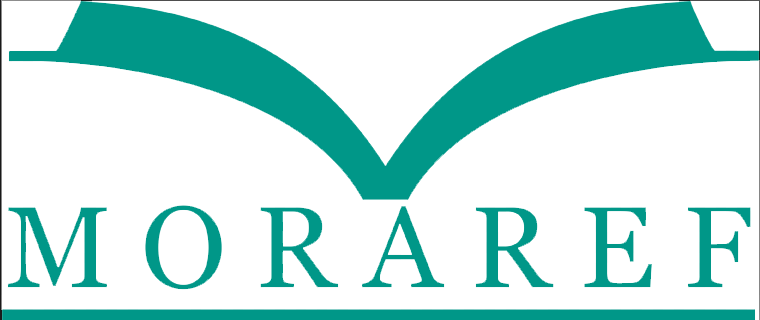INTELLIGENCE ANALYSIS THAT INFLUENCES ON CONFLICT MANAGEMENT IN THE DIGITAL ERA
Abstract
This study analyzes intelligence influencing conflict management in the digital era. This research is descriptive-explorative. The research location at the PKL Center Jl. Benteng Pancasila City of Mojokerto. The population of 369 MSME actors with the Slovin formula of 0.01 was determined by 79 respondents. Data collection using a questionnaire. Data analysis using SmartPLS version 3.3.7. Test the hypothesis by comparing the T-Statistics and P-Values. The results of this study are: communication intelligence, creative intelligence, and emotional intelligence have a significant effect on conflict management, social intelligence, and strategic intelligence has no effect on conflict management, communication intelligence, creative intelligence, emotional intelligence, social intelligence, and strategic intelligence simultaneously influence conflict management. Research recommendation: Combining this intelligence can resolve conflicts effectively and efficiently and avoid further damage to relationships.
References
Boone, L.E., Kurtz, D.L., & Berston, S. (2019).Contemporary Business. Wiley.
Branch, J. (2017). Territorial Conflict in the Digital Age: Mapping Technologies and Negotiation. International Studies Quarterly, 61(3), 557–569.
Burmeister, C., Lüttgens, D., & Piller, F. T. (2016). Business model innovation for Industry 4.0: Why the industrial internet mandates a new perspective on innovation. The operation, 2.
Butcher, C., & Hallward, M. C. (2019). Understanding International Conflict Management. Taylor & Francis.
Buzan, T. (2017). The Power of Creative Intelligence: 10 ways to tap into your creative genius. HarperCollins U.K.
Caputo, A., Ayoko, O. B., & Amoo, N. (2018). The moderating role of cultural intelligence in the relationship between cultural orientations and conflict management styles. Journal of Business Research, 89, 10–20. https://doi.org/10.1016/J.JBUSRES.2018.03.042
Carton, A. M., & Tewfik, B. A. (2016). Perspective - A New Look at Conflict Management in Work Groups. Organ. Sci., 27(5), 1125–1141. https://doi.org/10.1287/ORSC.2016.1085.
Chiabert, P., Bouras, A., Noël, F., & Ríos, J. (2018).Product Lifecycle Management to Support Industry 4.0: 15th IFIP WG 5.1 International Conference, PLM 2018, Turin, Italy, July 2-4, 2018, Proceedings (Vol. 540). Springer.
Chowdhury, S., Dey, P., Joel-Edgar, S., Bhattacharya, S., Rodriguez-Espindola, O., Abadie, A., & Truong, L. (2023). Unlocking the value of artificial intelligence in human resource management through A.I. capability framework. Human Resource Management Review, 33(1), 100899. https://doi.org/10.1016/J.HRMR.2022.100899.
Dai, X., & Chen, G. M. (2022). Conflict Management and Intercultural Communication: The Art of Intercultural Harmony. Taylor & Francis.
DeJager, C. (2020).Creative Intelligence (C.Q.)@ Play. eBook Partnership.
Dewi, L. K. C., SE, M. M., Wardana, I. M., SE, M. P., Yasa, N. N. K., SE, M. S., Sukaatmadja, I. P. G., & SE, M. P. (2021).Entrepreneurial Marketing, Customer Relationship Marketing, Product Innovation, and SME Competitiveness: Concepts and Applications in Research. Indonesian Science Media.
Dou, H., Juillet, A., & Clerc, P. (2019).Strategic Intelligence for the Future 1: A New Strategic and Operational Approach. Wiley. https://books.google.co.id/books?id=m8KODwAAQBAJ
Ellis, P. (2021). Leadership, management and team working in nursing. Leadership, Management and Team Working in Nursing, 1–100.
Fei, L., Deng, Y., & Hu, Y. (2019). DS-VIKOR: A new multi-criteria decision-making method for supplier selection. International Journal of Fuzzy Systems, 21, 157–175.
Flemisch, F. O., Pacaux-Lemoine, M. P., Vanderhaegen, F., Itoh, M., Saito, Y., Herzberger, N., Wasser, J., Grislin, E., & Baltzer, M. (2020). Conflicts in Human-Machine Systems as an Intersection of Bio-and Technosphere: Cooperation and Interaction Patterns for Human and Machine Interference and Conflict Resolution. Proceedings of the 2020 IEEE International Conference on Human-Machine Systems, ICHMS 2020. https://doi.org/10.1109/ICHMS49158.2020.9209517
Ford, P., & Near, M. (2016).The Root Cause Analysis of a Balanced Leader. AuthorHouse.
Gavrić, T. (2021). Conflict management strategies in family business. Economic Journal, 34(1), 101–114. https://doi.org/10.51680/EV.34.1.8
Goens, G.A. (2021).AI and Ed: Education in an Era of Artificial Intelligence. Rowman & Littlefield.
Gomathy, Dr. C. K. (2022). The Effect of Human Relation in Solving Conflicts in An Organization. Interantional Journal of Scientific Research in Engineering and Management, 06(02). https://doi.org/10.55041/IJSREM11555
Gonçalves, G., Reis, M., Sousa, C., Santos, J., Orgambídez-Ramos, A., & Scott, P. (2016). Cultural intelligence and conflict management styles.International Journal of Organizational Analysis, 24(4), 725–742. https://doi.org/10.1108/IJOA-10-2015-0923.
Gong, X., Zhang, K. Z. K., Chen, C., Cheung, C. M. K., & Lee, M. K. O. (2020). Antecedents and consequences of excessive online social gaming: a social learning perspective. Inf. Technol. People, 33(2), 657–688. https://doi.org/10.1108/ITP-03-2018-0138
Gunkel, M., Schlaegel, C., & Taras, V. (2016). Cultural values, emotional intelligence, and conflict handling styles: A global study. Journal of World Business, 51(4), 568–585. https://doi.org/10.1016/J.JWB.2016.02.001.
Haesevoets, T., de Cremer, D., Dierckx, K., & van Hiel, A. (2021). Human-machine collaboration in managerial decision making.Computers in Human Behavior, 119, 106730. https://doi.org/10.1016/J.CHB.2021.106730
Hasse, C. (2019). Posthuman learning: A.I. from novice to expert? AI & SOCIETY, 34(2), 355–364. https://doi.org/10.1007/S00146-018-0854-4.
Timurdipta, R., & Ariati, J. (2015). The relationship between interpersonal competence and academic achievement in regular class xi students at SMA 2 Kota Tangerang Selatan.Empathy Journal, 4(2), 8–13.
Hu, N., Wu, J., & Gu, J. (2019). Cultural intelligence and employees’ creative performance: The moderating role of team conflict in interorganizational teams. Journal of Management & Organization, 25(1), 96–116. https://doi.org/10.1017/JMO.2016.64.
Idrus, S. (2021).Writing a Thesis is as Easy as Making Fried Bananas: It is Important to Have Intention & Will. CV Literasi Nusantara Abadi.
Ivashkevych, E., & Onufriieva, L. (2021). The Development of Learner’s Autonomy by the Way of the Formation of Social Intelligence. Problems of Modern Psychology : Collection of Research Papers of Kamianets-Podilskyi National Ivan Ohiienko University, G.S. Kostiuk Institute of Psychology of the National Academy of Educational Sciences of Ukraine, 51, 9–32. https://doi.org/10.32626/2227-6246.2021-51.9-32.
Johnson, A. J. (2022). Mastering the Art of Suspense: How to Write Legal Thrillers, Medical Mysteries, & Crime Fiction. Andrea J. Johnson.
Kirpik, G., & Filizöz, B. (2022). Digital Conflicts in Human Resources Management. Conflict Management in Digital Business, 127–145. https://doi.org/10.1108/978-1-80262-773-220221010.
Krakauer, D. C., Page, K., & Flack, J. (2011). The Immuno-Dynamics of Conflict Intervention in Social Systems. PLoS ONE, 6(8). https://doi.org/10.1371/JOURNAL.PONE.0022709.
Lee, J., Suh, T., Roy, D., & Baucus, M. (2019). Emerging Technology and Business Model Innovation: The Case of Artificial Intelligence. Journal of Open Innovation: Technology, Market, and Complexity, 5(3). https://doi.org/10.3390/JOITMC5030044.
Lee, L.-Y. (2010). Multiple intelligences and the success of expatriation: The roles of contingency variables. African Journal of Business Management.
Levine, M. P. (2022). Interpersonal Relationships. IntechOpen.
Margret, A. C. R., Anyar Pantai, K., West, T., Tarakan, K., & Utara, K. (2020). The Effect of Emotional Intelligence on Conflict Management of Kaltara Business Polytechnic Students in terms of Student Gender.AGE, 1(1), 96–103.
Marlina, I., & Riyanto, A. (2022). Relationship of Emotional Intelligence to Conflict Management Ability of Nurses.Sriwijaya Journal of Nursing, 9(1), 1–6.
Martynenko, I. A., & Karandasheva, N. N. (2021). Emotional Intelligence in Law Students: Relevance of Development. Kutafin Law Review, 8(4), 626–646. https://doi.org/10.17803/2313-5395.2021.4.18.626-646
Masdar, M. (2020). Methods of Interprofessional Conflict Management.Indra Husada Health Journal. https://doi.org/10.36973/JKIH.V8I1.190.
McGraw, K. L., & Harbison, K. (2020). User-centered requirements: the scenario-based engineering process. CRC Press.
Merrill, R. M. (2021). Principles and Applications of Biostatistics. Jones & Bartlett Learning.
Min, J., Iqbal, S., Khan, M. A. S., Akhtar, S., Anwar, F., & Qalati, S. A. (2020). Impact of supervisory behavior on sustainable employee performance: Mediation of conflict management strategies using PLS-SEM. PLoS ONE, 15(9 September). https://doi.org/10.1371/JOURNAL.PONE.0236650.
Mohanty, S., & Vyas, S. (2018). How to compete in the age of artificial intelligence: Implementing a collaborative human-machine strategy for your business. Hurry.
Muftitama, A. (2020). Leadership Communication Strategy & Conflict Management with the LCCVASE Concept (Listening, Clarifying, Confirming, Verifying, Action-Solving, Evaluating).Ishlah: Journal of Ushuluddin Science, Adab and Da'wah, 2(2), 128–158.
Nelson, D. L., & Quick, J. C. (2013). Organizational behavior: Science, the real world, and you. Cengage learning.
Nelwan , J. Z. C. , Yasa , N. N. K. , Sukaatmadja , I. P. G. , & Ekawati , N. W. (2021).Internet Banking and Mobile Banking services at Bank KB Bukopin. Indonesian Science Media.
Novotny, A., Rasmussen, E., Clausen, T. H., & Wiklund, J. (2020).Research Handbook on Start-Up Incubation Ecosystems. Edward Elgar Publishing.
Nurhidayah, S., & Hadipranata, A. F. (2013). The Influence of Conflict Management Skills Training Toward Leaders’ Emotional Intelligence in Making Decision. Journal of Integrative Psychology, 1(2), 165–174.
Nussbaum, B. (2013). Creative intelligence: Harnessing the power to create, connect, and inspire. Harper Collins.
Oliveira, L., Tajariol, F., & Gonçalves, L.B. (2021).Digital Services in Crisis, Disaster, and Emergency Situations. . . . IGI Global.
Olsher, D. J. (2015). New Artificial Intelligence Tools for Deep Conflict Resolution and Humanitarian Response. Procedia Engineering, 107, 282–292. https://doi.org/10.1016/J.PROENG.2015.06.083.
Onufriieva , L. , Chaikovska , O. , Kobets , O. , Pavelkiv , R. , & Melnychuk , T. (2020). Social Intelligence as a Factor of Volunteer Activities by Future Medical Workers.Journal of History Culture and Art Research, 9(1), 84. https://doi.org/10.7596/TAKSAD.V9I1.2536
Özsungur, F. (2022).Conflict Management in Digital Business: New Strategy and Approach. Emerald Publishing Limited.
Pramudianto, P. (2021). The Influence of Coaching, Spirituality and Social Intelligence on Leadership.Economic Development Journal, 14(2), 288–299.
Prasetyo, A., & Adriyanto, A. T. (2021). The Effect of Communication Quality and Conflict Handling on Customer Relationship Marketing.Journal of Management and Applied Accounting (JIMAT), 12(1), 21–29.
Pustovalova, E. V., & Nagaytsev, V. V. (2021). Forms of Communication in the Dynamics of Social Conflict. Vestnik NSUEM, 1, 269–276. https://doi.org/10.34020/2073-6495-2021-1-269-276.
Qomariah, N. (2021).The Importance of Visitor Satisfaction and Loyalty: Study of the Influence of Customer Value, Brand Image, and Product Attributes on Visitor Satisfaction and Loyalty in Beach Tourism. Eternal Library.
Rahmani, M. A. C. (2020). The Effect of Emotional Intelligence on Conflict Management of Kaltara Business Polytechnic Students in terms of Student Gender.JAMAN (Journal of Management and Accounting Applications), 1(01), 96–103.
Grace, A. (2020). Research Methodology: Multidisciplinary Approach.Gorontalo: Ideas Publishing.
Ranjbar, M., & Bahariniya, S. (2021). The relationship between emotional intelligence and conflict management in healthcare systems: a case study in Iran. British Journal of Healthcare Management, 27(10). https://doi.org/10.12968/BJHC.2019.0107.
Redpath, S. M., Young, J., Evely, A., Adams, W. M., Sutherland, W. J., Whitehouse, A., Amar, A., Lambert, R. A., Linnell, J. D. C., Watt, A., & Gutiérrez, R. J. (2013). Understanding and managing conservation conflicts. Trends in Ecology & Evolution, 28(2), 100–109. https://doi.org/10.1016/J.TREE.2012.08.021
Saura, J. R., & Debasa, F. (2022). Handbook of Research on Artificial Intelligence in Government Practices and Processes. . . . IGI Global.
Scheef, A. R., Walker, Z. M., & Barrio, B. L. (2019). Salient employability skills for youth with intellectual and developmental disabilities in Singapore: the perspectives of job developers. International Journal of Developmental Disabilities, 65(1), 1–9. https://doi.org/10.1080/20473869.2017.1335479
Shahbaznezhadfard, M., & Yousefi, S. (2022). Development of a dynamics-based model for analyzing strategic water–environmental conflicts: systems thinking instead of linear thinking. Water Policy, 24(1), 83–100. https://doi.org/10.2166/WP.2021.145
Shamoradi, S. N., Jahangiri, P., Chahardoli, T., Tirafkan, K., & Mohajeran, B. (2014). Studying the Effect of Emotional Intelligence on Conflict Management Styles. Kuwait Chapter of Arabian Journal of Business & Management Review, 4(1), 390–400. https://doi.org/10.12816/0018921
Singh, A., & Shaurya, A. (2021). Impact of Artificial Intelligence on H.R. practices in the UAE. Humanities and Social Sciences Communications 2021 8:1, 8(1), 1–9. https://doi.org/10.1057/s41599-021-00995-4
Siregar, F. A., & Usriyah, L. (2021). The Role of Organizational Communication in Conflict Management.Idara (Journal of Education and Education), 5(2), 163–174. https://doi.org/10.47766/IDARAH.V5I2.147
Siu, O.C. (2019). The Influence of Student Activeness in Organizations on Social Intelligence Professional Management Study Program Management College Indonesia.Journal of Buddhist Education and Contemporary Social Issues (JPBISK), 1(1), 40–49.
Sridasweni, S., Yusuf, A. M., & Sabandi, A. (2017). Relationship between Emotional Intelligence and Interpersonal Communication with Student Conflict Management.Insight: Journal of Counseling Guidance, 6(2), 176–193.
Congratulations, B. (2022).Fundamentals of Quantitative (Explanative) Research Methodology. Deepublish.
Suliatin, S. (2021). The role of communication in conflict: A case study at pt. Liek motor. Journal of Professional Communications, 5(6), 516–532. https://doi.org/10.25139/JKP.V5I6.4241
Tambe, P., Cappelli, P., & Yakubovich, V. (2019). Artificial Intelligence in Human Resources Management: Challenges and a Path Forward. Https://Doi.Org/10.1177/0008125619867910, 61(4), 15–42. https://doi.org/10.1177/0008125619867910
Thakore, D. (2013). Conflict and conflict management. IOSR Journal of Business and Management (IOSR-JBM), 8(6), 7–16.
Todorova, G., Goh, K. T., & Weingart, L. R. (2022). The effects of conflict type and conflict expression intensity on conflict management. International Journal of Conflict Management, 33(2), 245–272. https://doi.org/10.1108/IJCMA-03-2021-0042
Ullah, R. (2022). The buffering role of emotional intelligence in conflict transformation. International Journal of Conflict Management, 33(2), 223–244. https://doi.org/10.1108/IJCMA-03-2021-0050
Unger, T. A., & Bruni, E. (2020). Incentivizing the Emergence of Grounded Discrete Communication Between General Agents. ArXiv.
Velikikh, K. (2021). Strategic Planning as a Management Tool. Series: Economic Science, 7(167), 34–39. https://doi.org/10.33042/2522-1809-2021-7-167-34-39
Vratskikh, I., Masa’deh, R. (Moh’dTaisir), Al-Lozi, M., & Maqableh, M. (2016). The Impact of Emotional Intelligence on Job Performance via the Mediating Role of Job Satisfaction. The International Journal of Business and Management, 11(2), 69. https://doi.org/10.5539/IJBM.V11N2P69
Vrontis, D., Christofi, M., Pereira, V., Tarba, S., Makrides, A., & Trichina, E. (2021). Artificial intelligence, robotics, advanced technologies and human resource management: a systematic review. The International Journal of Human Resource Management, 33(6), 1237–1266. https://doi.org/10.1080/09585192.2020.1871398
Wilkin, L. v, & Pathak, Y. (2022). De Gruyter Handbook of Organizational Conflict Management. DeGruyter.
Ximenes, M., Sudarmo, & Setyowati, K. (2021). Conflict Resolution on Martial Arts Organization Through Collaborative Governance: A Case Study in Timor Leste. Political Science. https://doi.org/10.2991/ASSEHR.K.211028.124
Xiong, W., Fan, H., Ma, L., & Wang, C. (2022). Challenges of human—machine collaboration in risky decision-making. Frontiers of Engineering Management 2022 9:1, 9(1), 89–103. https://doi.org/10.1007/S42524-021-0182-0
Zhulina, E. G., Kuznetsova, I. V., & Voronina, N. A. (2020). Organizational Conflict Management Methodology. Scientific Review Theory and Practice, 2779–2791. https://doi.org/10.35679/2226-0226-2020-10-11-2779-2791.
Copyright (c) 2023 Assets : Jurnal Ekonomi, Manajemen dan Akuntansi

This work is licensed under a Creative Commons Attribution-NonCommercial-ShareAlike 4.0 International License.










